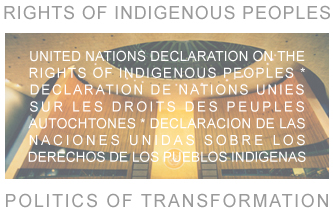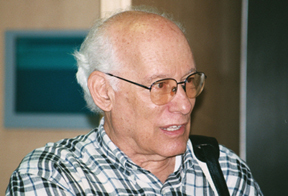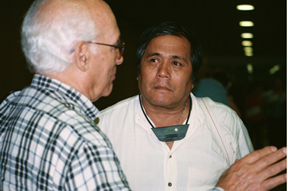|
Introduction I
Universal Declaration
I Transformation I
Standard Setting I
Living Law - Article 42 |
 |
The implementation of human rights based actions enshrined
in the United Nations Declaration on the Rights of Indigenous Peoples. |
In this section of Dialogue Between Nations, we focus upon the Politics
of Transformation and new relationships: relationships built upon mutual
respect amongst all those who are willing to engage, and be engaged in
transparent dialogue. This is a dialogue based upon the implementation
of the UN Declaration on the Rights of Indigenous Peoples. It is a
dialogue between Indigenous Peoples, representatives of their nations,
communities and organizations and representatives of nation states as
well as international agencies, all of whom need to find a way to share
solutions in the same landscape of risk: this tumultuous world in which
all of us live.
This dialogue appears to be emerging beyond already complex indigenous
government to nation state relations. Indigenous leaders and community
organizers around the world are setting an agenda that puts free, prior
and informed consent on the table with corporations, multilateral banks,
local industry and judicial systems. There are three important factors
to be considered: the terms of engagement and of course, is anyone out
there really listening to the Indigenous voice? And finally, how much of
any new relationship is predicated on self-interest and accountability?
Until recently, many nation states have neither respected nor
appreciated the presence of Indigenous Peoples within their boundaries
and their communities. One simple observation is that States fear the
empowerment of Indigenous Peoples. Most policies of integration have
been based upon killing the Indian in the child, a process of
assimilation that instead of producing self-sufficient balanced
individuals and communities, has created even deeper wounds. |

Dr. Rodolfo Stavenhagen
Former UN Special Rapporteur on the situation of human rights
and fundamental freedoms of Indigenous People |
| “The shift”, as
the esteemed Dr. Stavenhagen, former UN Special Rapporteur on the
situation of human rights and fundamental freedoms of Indigenous
Peoples, suggests, “is a challenge for the re-design of the Nation State
with the full inclusion of Indigenous Peoples as rightsholders. While
such a methodology remains to be developed, the outcome would strengthen
the fabric and social, economic and cultural reality of human
interaction and future beneficiaries. No one, neither Indigenous
Peoples, nor States, nor all of their citizens can afford to isolate one
another in the years that lie ahead.” |

Eusebio Loreto Julio
Nahua
President, Consejo Indígena Permanente A.C. Mexico
President of the World Council of Indigenous Peoples 2008 – 2012 |
|
|
|
WE INVITE YOU TO BE IN
THE GLOBAL DIALOGUE |

POLITICS OF TRANSFORMATION |
|
Introduction I
Universal Declaration
I Transformation I
Standard Setting I
Living Law - Article 42 |
 |

S I T E M A P
M A P A D
E L S I T I O
dbn@dialoguebetweennations.com
Copyright Natalie Drache 1999 |




